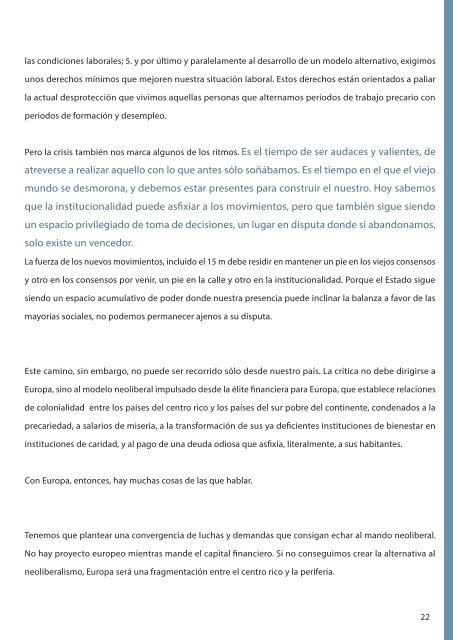cartas a @ s europe @ s cartas al europe letterstotheeuropeans
cartas a @ s europe @ s cartas al europe letterstotheeuropeans
cartas a @ s europe @ s cartas al europe letterstotheeuropeans
You also want an ePaper? Increase the reach of your titles
YUMPU automatically turns print PDFs into web optimized ePapers that Google loves.
las condiciones labor<strong>al</strong>es; 5. y por último y par<strong>al</strong>elamente <strong>al</strong> desarrollo de un modelo <strong>al</strong>ternativo, exigimos<br />
unos derechos mínimos que mejoren nuestra situación labor<strong>al</strong>. Estos derechos están orientados a p<strong>al</strong>iar<br />
la actu<strong>al</strong> desprotección que vivimos aquellas personas que <strong>al</strong>ternamos periodos de trabajo precario con<br />
periodos de formación y desempleo.<br />
Pero la crisis también nos marca <strong>al</strong>gunos de los ritmos. Es el tiempo de ser audaces y v<strong>al</strong>ientes, de<br />
atreverse a re<strong>al</strong>izar aquello con lo que antes sólo soñábamos. Es el tiempo en el que el viejo<br />
mundo se desmorona, y debemos estar presentes para construir el nuestro. Hoy sabemos<br />
que la institucion<strong>al</strong>idad puede asfixiar a los movimientos, pero que también sigue siendo<br />
un espacio privilegiado de toma de decisiones, un lugar en disputa donde si abandonamos,<br />
solo existe un vencedor.<br />
La fuerza de los nuevos movimientos, incluido el 15 m debe residir en mantener un pie en los viejos consensos<br />
y otro en los consensos por venir, un pie en la c<strong>al</strong>le y otro en la institucion<strong>al</strong>idad. Porque el Estado sigue<br />
siendo un espacio acumulativo de poder donde nuestra presencia puede inclinar la b<strong>al</strong>anza a favor de las<br />
mayorías soci<strong>al</strong>es, no podemos permanecer ajenos a su disputa.<br />
Este camino, sin embargo, no puede ser recorrido sólo desde nuestro país. La crítica no debe dirigirse a<br />
Europa, sino <strong>al</strong> modelo neoliber<strong>al</strong> impulsado desde la élite financiera para Europa, que establece relaciones<br />
de coloni<strong>al</strong>idad entre los países del centro rico y los países del sur pobre del continente, condenados a la<br />
precariedad, a s<strong>al</strong>arios de miseria, a la transformación de sus ya deficientes instituciones de bienestar en<br />
instituciones de caridad, y <strong>al</strong> pago de una deuda odiosa que asfixia, liter<strong>al</strong>mente, a sus habitantes.<br />
Con Europa, entonces, hay muchas cosas de las que hablar.<br />
Tenemos que plantear una convergencia de luchas y demandas que consigan echar <strong>al</strong> mando neoliber<strong>al</strong>.<br />
No hay proyecto <strong>europe</strong>o mientras mande el capit<strong>al</strong> financiero. Si no conseguimos crear la <strong>al</strong>ternativa <strong>al</strong><br />
neoliber<strong>al</strong>ismo, Europa será una fragmentación entre el centro rico y la periferia.<br />
22<br />
Juventud Sin Futuro<br />
solution to precarious working conditions; 5. Fin<strong>al</strong>ly, and in par<strong>al</strong>lel to the development of an <strong>al</strong>terna-<br />
tive model, we demand minimum rights that might improve our employment situation. These rights are<br />
designed to <strong>al</strong>leviate the current lack of protection to those who juggle between precarious work, training<br />
and unemployment.<br />
But the crisis marks some of our own rhythms. This is the time to be bold and brave, to dare achieving<br />
what we had only dreamt of. This is the time where the old world f<strong>al</strong>ls apart and we must be<br />
present to build our own world. Today we know that institutions can suffocate movements<br />
but this is <strong>al</strong>so a privileged space for decision-making, a place of important disputes that will<br />
only have one winner if we abandon it.<br />
The strength of new movements, including of the 15 M, must reside on an equilibrium that keeps one foot on<br />
the old consensus and other on the consensus to come, one foot on the streets and the other on the institu-<br />
tions. Because the state is still a space of power accumulation where our presence may make the difference,<br />
tipping the sc<strong>al</strong>e in favour of the soci<strong>al</strong> majorities, we cannot be apart from this dispute.<br />
However, this path cannot be done only in our country. Criticisms must not be directed to Europe but to the<br />
neoliber<strong>al</strong> model prompted in Europe by the financi<strong>al</strong> elite, which establishes coloni<strong>al</strong> relations between<br />
the rich centr<strong>al</strong> countries and the poor southern countries of the continent, condemned to precariousness,<br />
to miserable wages, to transform their inefficient institutions of welfare into charity institutions, and to pay<br />
an odious debt that liter<strong>al</strong>ly suffocates its inhabitants.<br />
With Europe, then, we have plenty to t<strong>al</strong>k about.<br />
We must create a union between the different struggles and demands that can stand against and defeat<br />
the neoliber<strong>al</strong> control. There will be no European project as long as the financi<strong>al</strong> capit<strong>al</strong> dictates the rules. If<br />
we cannot create an <strong>al</strong>ternative to neoliber<strong>al</strong>ism Europe will be a fragmentation between a rich centre and<br />
a poor periphery.<br />
23


